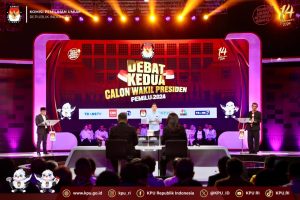Indonesia is currently in the grip of election season, with the presidential election, and simultaneous wider legislative elections, to take place on February 14.
It is not just Indonesians that will go to the polls in 2024, as more than 60 other countries will hold regional, legislative, and presidential elections, including the United States, India, Cambodia, and Taiwan, leading to 2024 being dubbed “the biggest election year in history.”
Always an exciting time, Indonesian election season also brings with it the chance for presidential and vice presidential candidates to spar in a series of five televised debates, each organized around a theme including law and human rights, the economy, security and geopolitics, the environment, and information technology.
So far, presidential candidates clashed over law and human rights issues on December 12, while vice presidential candidates took on the theme of the economy in the second debate on December 22.
But how much do electoral debates matter and how helpful are they at demonstrating the electability of candidates?
Of the two Indonesian televised debates so far, the second was by far the more interesting, as it pitted vice presidential hopefuls Mahfud MD, Muhaimin Iskandar, and Gibran Rakabuming Raka (current president Joko “Jokowi” Widodo’s son) against each other.
However, reviews of the debate were mixed.
Some felt that Gibran, a relative newcomer to politics having served as the mayor of Surakarta (also known as Solo) for just two years, dominated the debate and demonstrated a solid knowledge of economic issues.
Others, however, felt that it was a showing more of style than substance.
One of the key issues with the second debate was that the questions, set by a team of experts and economists, were both broad in scope, asking candidates to tackle a range of economic issues, and also extremely specific.
Unless you were an economist, or at least extremely well-versed in economic issues, it was difficult to judge the various answers given by the candidates.
Another issue was whether it was fair to ask candidates complex questions on a range of randomly assigned topics regardless of their backgrounds.
Mahfud MD, for example, is Indonesia’s coordinating minister for political, legal and security affairs. Had he been involved in the first debate about law and human rights, he would likely have dominated the stage, yet he appeared ill at ease with many of the questions about economics, which one might say is fair because that is not his job.
At some points in the debate, Mahfud also resorted to replying to questions about the economy by discussing the technicalities of drafting various laws, which were technically correct but likely lost in translation to the average person watching or anyone without a legal background.
Muhaimin also appeared to struggle with the nitty gritty of economic and budgeting issues across Indonesia, which is perhaps more surprising as he is the deputy speaker of the People’s Representative Council and has worked in the industry, trade, and development sectors. However, many also felt that he was unfairly wrong-footed when Gibran asked him a question about SGIE, using the English acronym for the State of the Global Islamic Economy – an annual report about Muslim spending.
To his credit, rather than guess, Muhaimin answered that he did not know the meaning of SGIE, to which the moderators of the debate interjected and said that he was not allowed to ask questions of Gibran.
In terms of proper procedure, however, it seems that Gibran should not have been allowed to couch the question in such obscure terms, particularly when you consider that the debate was meant to be a public event and most members of the public were likely also unfamiliar with the English acronym or its wider meaning.
If no one understands the questions, including the debaters, then what value is there in asking them?
At another point in the debate, which lasted a laborious two and a half hours, Gibran and Mahfud sparred over the difference between increasing tax revenues and increasing the tax ratio – which are different issues because tax revenue is a nominal figure, while the tax ratio is a relative measure of tax revenue to gross domestic profit.
Again however, unless you know the difference (which I did not at the time), it would be impossible to know who was correct (Mahfud in this case) as the two men disagreed about the definitions.
As such, with such complicated questions and a lack of input or fact-checking by the moderators or experts present, it is not unfair to suggest that the debate was indeed a showing of style over substance and that many people watching would have had to rely on the outward presentations by the candidates rather than the minutiae of their (often overly technical) answers.
It is easy therefore to criticize commentators for saying that Gibran appeared “confident” while the other two candidates seemed to be “struggling,” but unless you have a deep knowledge of tax ratios, the inner workings of industrial downstreaming, and the mechanics of Indonesia’s maddeningly complex regional and national budgets, then what else can you be expected to look for?
If you have to be an expert to judge a debate, is there any point in even having one?

































